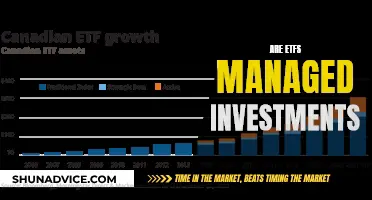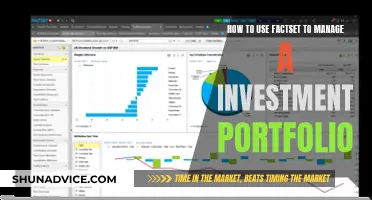
An equity investment portfolio is a collection of stocks or shares purchased in a company, with the expectation that they will increase in value over time. Equity investors buy shares in a company, which are then traded on a stock exchange. The primary motivation for investors is that the value of their shares will rise, resulting in what is known as capital gains, and/or the generation of capital dividends. Equity funds, also known as stock funds, are professionally managed and aim to reduce risk by diversifying their stock portfolio across many companies.
What You'll Learn

Equity investment portfolio management
Equities represent a sizable portion of the global investment universe and are often a primary component of investors' portfolios. They can provide several roles or benefits to an overall portfolio, including capital appreciation, dividend income, diversification with other asset classes, and a potential hedge against inflation. The inclusion of equities in a portfolio can be driven by a client's goals or needs. Portfolio managers consider various investment objectives and constraints when deciding to include equities, such as risk objective, return objective, liquidity requirement, time horizon, tax concerns, legal and regulatory factors, and unique circumstances.
Building and managing an equity investment portfolio requires knowledge of key elements such as asset allocation, diversification, and rebalancing. Portfolio managers may use portfolio modelling, which involves creating a standard portfolio that individual portfolios are then matched against. This allows for efficiency in decision-making and can be achieved through specialised software.
Equity investment portfolios can be managed actively or passively. Active management involves strategically buying and selling stocks to beat the market's performance, while passive management seeks to match the market's returns by mimicking an index. Active management is more costly and historically tends to underperform, while passive management is a long-term, low-cost strategy.
Overall, equity investment portfolio management is a complex process that requires a strong understanding of financial markets, investment objectives, and risk management. It involves constructing and overseeing a portfolio of equity investments that align with the client's goals and risk tolerance while also considering tax implications and other relevant factors.
Investment Management: PlainsCapital's Offerings and Your Financial Future
You may want to see also

The role of equities in a portfolio
Equities represent a significant portion of the global investment universe and are often a primary component of investors' portfolios. They can play several roles and offer various benefits to an overall portfolio.
One of the primary rationales for including equities in a portfolio is the potential for capital appreciation. Equity investors purchase shares of a company, anticipating that their value will increase over time, resulting in capital gains. This appreciation in value can lead to higher returns for investors. Additionally, equities can provide dividend income, which is another source of profit for investors.
Equities also contribute to diversification within a portfolio. They enable investors to participate in the growth and earnings prospects of an economy's corporate sector and gain ownership interests in a diverse range of business entities, varying in size, economic activity, and geographical scope. This diversification can help mitigate risks associated with concentrating investments in a single entity, sector, or country.
Furthermore, equities are generally more liquid than other asset classes. Publicly traded equities are easily traded on stock exchanges, allowing investors to monitor price trends and make transactions with lower costs. This liquidity provides investors with greater flexibility and control over their portfolios.
In addition to the benefits mentioned above, equities can also serve as a potential hedge against inflation. They may enable investors to protect their capital from the eroding effects of rising inflation.
The inclusion of equities in a portfolio is often guided by a client's goals and needs. Portfolio managers consider various factors, such as risk objectives, return objectives, liquidity requirements, time horizon, tax concerns, legal and regulatory factors, and unique circumstances, when deciding to include equities.
Overall, equities play a crucial role in investment portfolios by offering capital appreciation, dividend income, diversification, liquidity, and inflation hedging. They provide investors with opportunities to participate in the growth of diverse businesses and economies while also offering flexibility and potential for higher returns.
Private Investment in India: What's the Deal?
You may want to see also

Equity investment universe
Size and Style
Equity investment managers are often constrained by market capitalization guidelines. Small-cap managers, for instance, may only be allowed to select stocks in the $250 million to $1 billion market cap range. Equity funds are often categorized based on the size of the companies they invest in, with large-cap funds investing in companies with a market capitalization of over $10 billion, mid-cap funds investing in companies with a market cap between large and small companies, and small-cap funds investing in companies with a market cap under $2 billion.
Geography
Geographically focused funds, also known as regional funds, invest in companies based in certain areas of the world. Domestic funds focus on companies within the investor's home country, international funds on companies outside, and global funds on companies worldwide. There are also emerging market funds that invest in developing economies such as China, India, or Brazil.
Economic Activity
Economic activity is another factor that influences the equity investment universe. Some portfolio managers use a bottom-up approach, selecting stocks without considering sectors or economic forecasts. Others are top-down oriented, using entire sectors or macroeconomic trends as a starting point for analysis and stock selection.
Other Factors
Other factors that influence the equity investment universe include the investment objectives and constraints of the client, such as risk tolerance, return objectives, liquidity requirements, time horizon, tax concerns, legal and regulatory factors, and unique circumstances. The investment philosophy and constraints of the investment firm also play a role, with some firms having strictly defined parameters for stock selection and asset management.
Investment Decision-Making: Financial Management Strategies Explained
You may want to see also

Income and costs in an equity portfolio
Equity income primarily refers to income from stock dividends, which are cash payments from companies to their shareholders as a reward for investing in their stock. Companies generally pay dividends when they have limited investment opportunities and excess cash available as a way to reward shareholders, attract investor capital, and support their share prices. Equity income adds an additional return component to capital gains, making up for a lack of explosive growth potential.
Sources of equity portfolio income include dividends, securities lending fees and interest, dividend capture, covered calls, and cash-covered puts (or cash-secured puts).
Dividend-paying companies are typically large, well-established companies with mature revenue and earnings. Most dividend-paying companies also have a well-established commitment to paying shareholders dividends, with a targeted annual dividend payout rate factored into their corporate financial planning.
Income-paying stocks or funds are typically preferred by more conservative investors looking for long-term income. Investors interested in equity income should look to quality stocks that have a high dividend yield—both trailing and forward yield.
Mutual funds and exchange-traded funds (ETFs), which are investment vehicles that contain a basket of securities, can be managed with a focus on equity income. These funds invest in dividend-paying stocks.
Large and established companies—called blue chips—often provide high dividend payments. The Dow Jones Industrial Average contains 30 blue-chip stocks, some of which pay lucrative dividends.
Vanguard, for example, offers some of the best dividend-paying funds for a relatively low expense ratio. These funds track an index of stocks that often pay an attractive dividend.
An equity-income investment's dividend yield is a top characteristic considered in equity income investing. Stocks and funds will have a trailing and forward dividend yield that helps investors gauge the payout as a percentage of the price.
Successful income investing isn't just about hunting down the highest yields, though. Investors should consider how sustainable the dividend is, the potential for payouts to grow, and whether there is a dividend reinvestment plan (DRIP) that allows them to reinvest the dividends in fractional shares of the stock or fund.
Taxes are another important consideration. Investors must pay taxes on equity income received from stock and fund investments regardless of whether or not the distributions are reinvested.
Sources of equity portfolio costs include management fees, performance fees, administration fees, marketing/distribution fees, and trading costs.
Labor-Saving Equipment: Worth the Investment for Automotive Division?
You may want to see also

Shareholder engagement
An equity investment is money that is invested in a company by purchasing shares of that company in the stock market. These shares are typically traded on a stock exchange. The main benefit of equity investment is the possibility of increasing the value of the principal amount invested, which comes in the form of capital gains and dividends.
The benefits of shareholder engagement include improved corporate governance and performance, which ultimately benefit shareholders through increased share value. Additionally, active managers can use shareholder engagement to achieve benchmark outperformance, benefiting shareholders with financial interests and those with ESG concerns.
However, shareholder engagement has its limitations and potential downsides. Excessive engagement may shift the focus from long-term objectives to short-term gains. There are also legal concerns, as engagement activities must be careful not to violate insider trading laws. Additionally, conflicts of interest may arise between the interests of engaged managers and those of company executives.
To promote effective shareholder engagement, large investment firms may employ ESG-focused analysts alongside traditional analysts to address non-financial issues. These analysts primarily deal with shareholder voting decisions and environmental and societal concerns. The development of corporate governance services, such as governance ratings and proxy advice, further supports institutional investors in monitoring and making informed decisions.
Indian Chickpea Exports: A Smart Investment Strategy
You may want to see also
Frequently asked questions
An equity investment portfolio is a collection of stocks or shares in a company or companies, traded on a stock exchange. An equity fund pools money from investors to buy a portfolio of stocks.
Equity investment portfolios can provide several benefits, including diversification, professional management, and the potential for superior returns. They can also act as a hedge against inflation.
The main risk of an equity investment portfolio is market risk. Prices can decline due to economic downturns, geopolitical events, or changes in investor sentiment. Other types of risk include credit risk, foreign currency risk, liquidity risk, and political risk.







